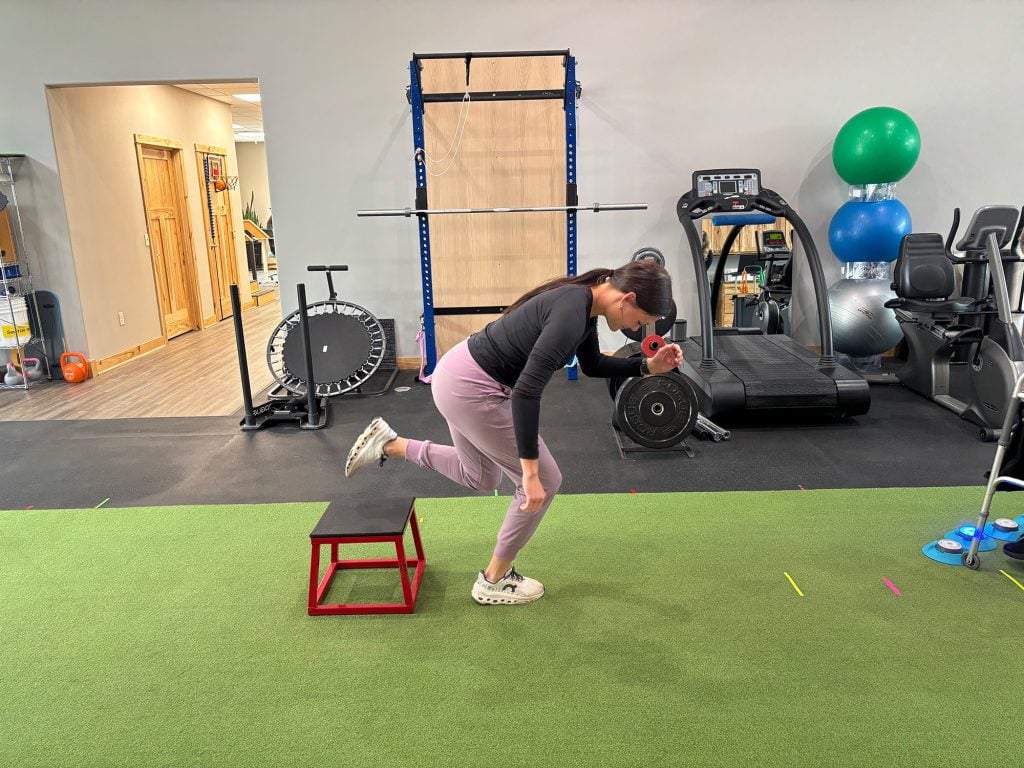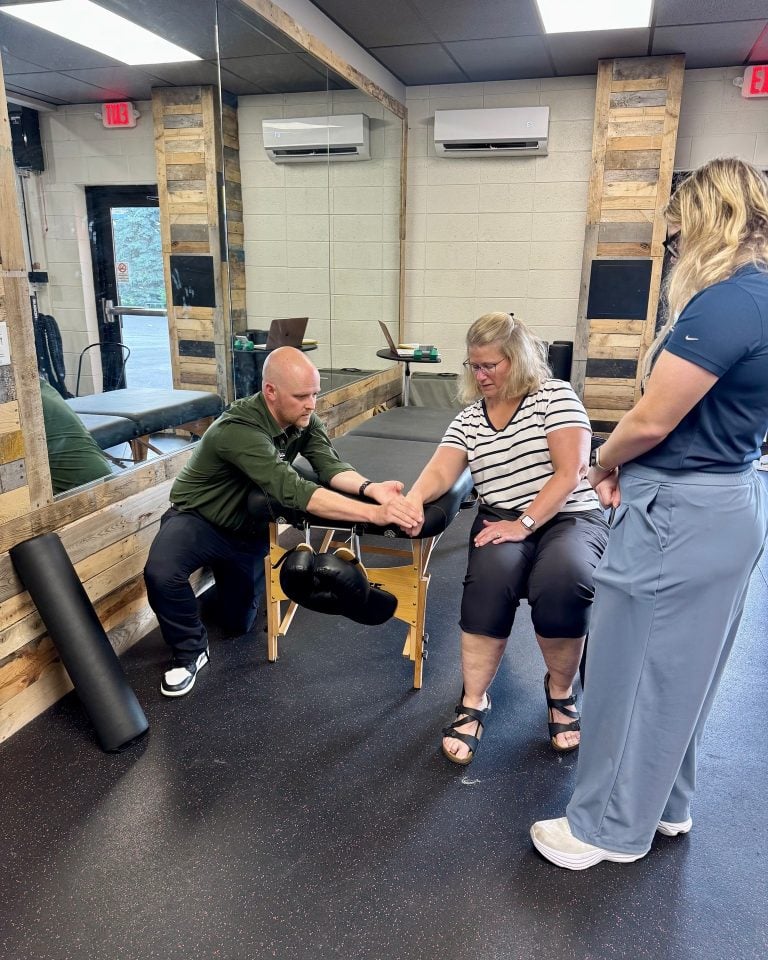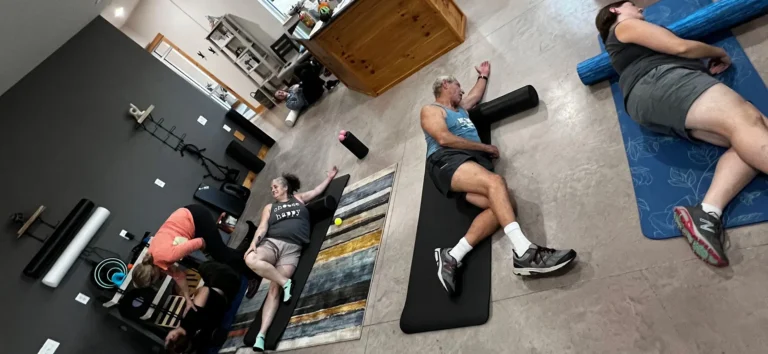What to Expect
What is Physical Therapy?
Physical therapists are highly educated, licensed health care providers. They examine, evaluate, and treat people whose health conditions may limit their ability to move and function. Physical therapists help people maintain, improve, or restore mobility.
Physical therapy treatment can help you:
- Reduce and manage pain.
- Avoid the long-term use of prescription opioids and their side effects.
- Prevent or postpone the need for surgery for many conditions.
- Restore function.
Physical therapists are movement experts who improve quality of life through hands-on care, patient education, and prescribed movement. You can make an appointment for an evaluation with a physical therapist without a doctor’s referral.
Here are some things you can do to get the most out of your first visit with Optimal Physical Therapy.


Before Your Visit
Make a list of any questions you have and want to ask your physical therapist. Write down any symptoms you’ve been having and for how long. If you have more than one area of symptoms, begin with the one that bothers you the most. Describe whether your pain or symptoms are:
- Better or worse with specific movements, activities, or positions such as sitting or standing.
- More noticeable at certain times of the day.
- Relieved or made worse by resting or a specific task or activity.
- Write down key information about your medical history, even if it seems unrelated. For example. List all prescribed and over-the-counter medicines you take or have taken within the last month. Don’t forget to include any vitamins and supplements you take.
- Make a note of any relevant personal information. Include things that you believe might be linked to your condition, such as: recent stressful events, injuries, incidents or accidents, your home or work environment, and list any medical conditions of your parents or siblings.
- Ask a family member or trusted friend to go with you to your appointment. They can help you remember details from your health history and take notes to help you remember what was discussed during your visit.
- If you wear glasses or use a hearing aid, take them with you. Tell your physical therapist and clinic staff if you have a hard time seeing or hearing.
- Take any lab, imaging, or reports from other health care providers with you that are related to your medical history or current condition.
- Bring a list of your doctors and other health care providers. Your physical therapist can discuss their findings and your progress with them. Physical therapists partner with other health care providers to ensure you get the best possible care.
- When you make your appointment, ask whether you should wear or bring a certain type of clothing for your first visit. Don’t wear clothing that doesn’t stretch. Your physical therapist may have you take part in treatment activities during your first session.
Financial Considerations
- Carefully review our financial policy. If you do not receive it at your first appointment, ask for a copy. If anything is unclear, ask questions or ask for someone to explain the policy to you before starting treatment.
- Optimal Physical Therapy is a provider with most major insurance companies. As a courtesy, we will verify physical therapy benefits prior to your initial evaluation and obtain authorization if needed. We file insurance claims for each date of service and claims are reviewed and reimbursed according to the terms of your insurance policy. You will be informed of your financial responsibility at your first appointment. All Co-pays or Co-insurance is expected at CHECK-IN for each appointment. Billing is managed by WebPT Billing Services.
- The physical therapy clinic will ask you to sign the financial agreement. Read it carefully and ask questions if anything is unclear.
- The clinic staff will request payment of any deductibles and copayments before or after each visit. Paying these at the time of service will help you better manage health care costs and avoid a large bill after treatment ends.
- If you need to change how often you have physical therapy for financial reasons, discuss this with your physical therapist. They can explore options and develop a workable plan to help you get the care you need.
- If you change or lose your insurance coverage, be sure to inform your physical therapist and the clinic’s front office staff.


What to Expect at Your First Visit
Your physical therapist will begin by asking you lots of questions about your health. These will include specific questions about your condition and any symptoms that led you to see them. The details you give will help your physical therapist assess whether you are likely to benefit from physical therapy. It also will help them choose the treatments that are most likely to help YOU..
Your physical therapist also will ask you specific questions about your home or work setting, your health habits and activity level, and your leisure and sports interests. Their goal is to help you become as active and independent as possible and return to the activities you enjoy. Your physical therapist will perform a detailed exam. Depending on your symptoms and condition, your physical therapist may evaluate your: strength, flexibility, balance, coordination, posture, blood pressure, heart and respiration rates, etc.
Your physical therapist may use their hands to examine or feel on or around the area of concern. They also will assess the motion and function of your joints, muscles, and other tissues. Your physical therapist also may check: how you walk (your gait), how you get up from a lying position or get in and out of a chair (functional activities), and how you use your body for certain activities (body mechanics).
Your physical therapist will work with you to determine your goals for physical therapy. Then, they will create a treatment plan for your specific conditions and goals. In many cases, the physical therapist will diagnose your condition and begin treatment right away.
A main goal of treatment is to improve or maintain your ability to do daily tasks and activities. Your physical therapist may address pain, swelling, weakness, and limited motion to help you reach this goal. They will check your response to each treatment and make changes as often as needed. Physical therapy may speed your recovery.
Treatment Plan
Education is an important aspect of your physical therapy treatment. Your physical therapist may teach you special exercises to do at home. They also may show you different ways to do your work and home activities. The goal is to lessen or get rid of the problem believed to be the reason for your pain,s train, or injury and show you ways to stay healthy.
Your physical therapist will assess your need for special equipment. For example, they may suggest special footwear, splints, or crutches. They also may advise that you use special devices to help make your home a safer place for you, especially if they find that you are at an increased risk of falling. They will determine what equipment you need based on your situation. They may either provide it for you or tell you where you can find it. If you do need special equipment, your physical therapist can show you how to use it properly.
Your physical therapist will share important information with your doctor and other health care providers at your request.
Your physical therapist will recheck your progress often throughout your plan of care. They will work with you to plan for your discharge from physical therapy when you are ready. Make sure to talk with your physical therapist about what to do if you have questions after discharge or if your symptoms or conditions worsen.
Your physical therapy visit may include working with a physical therapist assistant on exercises prescribed by your physical therapist. Physical therapists and PTAs work together and with other health care providers to make sure you get the care you need.


Getting the Most Out of Physical Therapy
You will get out of your physical therapy sessions what you put into them. It will take a certain amount of effort on your part, as agreed between you and your physical therapist, to get the most benefit from each session. Here are four tips to help you get the most out of physical therapy:
#1 Keep your appointments
#2 Follow your physical therapist’s instructions
#3 Do your home exercise program
#4 Continue your after-care plan




